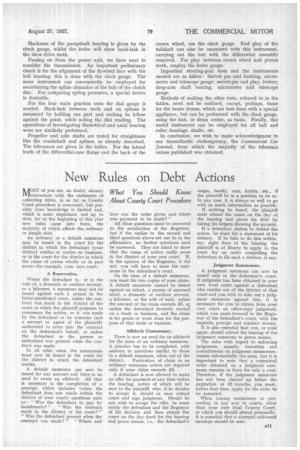New Rules on Debt Actions
Page 45

If you've noticed an error in this article please click here to report it so we can fix it.
What You Should Know About County Court Procedure
lk MOST of you are, no doubt, already IVIconversant with the rudiments of collecting debts, in so far as County Court procedure is concerned, but possibly your knowledge is limited and, which is more important, not up to date, for at the beginning of this year new rules came into force, the majority of which affects the ordinary or simple debt.
An ordinary or a default summons may be issued in the court for the district in which the defendant (your debtor) resides or carries on business,. or in the court for the district in which the cause of action wholly or in part arose—for example, your own court.
A Reservation.
Where the defendant is, or is the wife of, a domestic or outdoor servant, or a labourer, a summons may not be issued against such a person in the latter-mentioned court, unless the contract was made in the district of the court in which the plaintiff proposes to commence the action, or it was made by the defendant or by someone (not a servant or agent of the plaintiff) authorized to enter into the contract on the defendant's behalf, or unless the defendant or the person so authorized was present when the contract was made.
In all other cases, the summonses must now be issued in the court for the district in which the defendant resides.
A default summons can now be issued for any amount and there is no need to swear an affidavit. All that is necessary is the completion of a prxcipe, which includes (when the defendant does not reside within the district of your court) questions such as: "Was the defendant to pay by instalments? " "Was the contract made in the district of the court? " "Was the defendant present when the
contract was made? "Where and how was the order given and where was payment to be made?"
All these questions must be answered to the satisfaction of the Registrar, but if the replies to the second and third questions above set out be in the affirmative, no further questions need be answered. They are asked to show that the cause of action really arose in the district of your own court. If, in the opinion of the Registrar, it did not, you will have to issue the summons in the defendant's court.
On the issue of a default summons, you must file two copies of your claim. A default summons cannot be issued against an infant, a person of unsound mind, a domestic or outdoor servant, a labourer, or the wife of such, unless the amount of the claim exceeds 0, ez unless the defendant formerly carried on a trade or business, and the claim is for goods or work done for the purpose of that trade or business.
Affidavit Unnecessary.
There is now no need for an affidavit for the issue of an ordinary summons. A practice has to be completed, with answers to questions similar to those in a default summons, when out of the district. Particulars of claim in an ordinary summons action are required
only if your claim exceeds £2. •
A defendant is now allowed to make an offer for payment at any time before the hearing, notice of which will be sent to the plaintiff, who, if he decides to accept it, should at once attend court and sign judgment. Should he not wish to accept the offer, he must notify the defendant and the Registrar of his decision and then attend the court on the day fixed for the hearing and prove means, i.e., the defendant's wages, family, rent, habits, etc., if the plaintiff be in a position to do so. In any case, it is always as well to go with as much information as possible.
If nothing be heard, the plaintiff must attend the court on the day of the hearing and prove his debt by taking his ledgers showing the account.
If a defendant desires to defend the action, he must file a statement of his defence. If he fails to do this within, say, eight days of the hearing, the plaintiff is at liberty to apply to the court for an order compelling the defendant to file such a defence, if any.
Judgment Summonses.
A judgment summons can now be issued only in the defendant's court. If judgment has been obtained in your own local court against a defendant who resides out of the district of that court and you wish to take out a judgment summons against him, it is necessary for you to obtain from .your own court an office-copy judgment, which you must forward to the Registrar of the defendant's court, with the requisite proecipe and conduct money.
It is also essential that you, or your agent, should attend the hearing of the judgment summons to prove means.
The rules with regard to enforcing judgments, namely, execution and commitments on judgment summonses, remain substantially the same, but it is important to note that a committal order obtained on a judgment summons remains in force for only a year. Therefore, if the judgment summons has not been cleared up before the expiration of 12 months, you must, before that time, apply for the order to be extended.
When issuing summonses or proceeding in any way in courts, other than your own local County Court, at which you should attend personally. it is essential that a stamped addressed envelope should he sent.




















































































